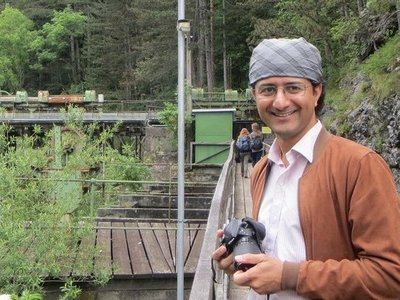

Muhammad Bilal Bin Majeed has obtained his PhD at the University of Veterinary Medicine Vienna with the support of the HEC-OeAD scholarship. He most recently returned to Austria for research in 2024 with an Ernst Mach Follow-up grant. He is working as an Assistant Professor at the University of Veterinary & Animal Sciences in Lahore. His research work mainly focusses on molecular genetics and CRISPR gene editing. Under the HEC NRPU project, Dr. Majeed established a laboratory at his home university, and has supervised 10 master students. He recently published an article that describes the outcome of the project.
Very briefly, aspergillosis is a fungal disease that causes respiratory problems in humans, animals and birds. This fungus produces toxins (gliotoxins) that are one of the contributing factors to trigger the development of this disease. Production of these toxins by the fungus is controlled by 13 genes. Dr. Majeed and his team applied CRISPR gene editing tools to target three of these genes (namely gliA, gliP and gliZ) and found that the toxins production was significantly reduced after editing these genes. The pathogenicity of the fungus may, thus, be minimized and the edited fungus may be used for future use to develop DNA-based solutions for aspergillosis.
Many people, including his research associates Rida, Arsh, Zakia, Mishal and Mahreen, contributed towards the success of this project. After completion of this project work, he is now working to have a joint research project to study the role of genes in muscle development in fish and animal models. This work shall contribute in Sustainable Development Goal 2: Zero Hunger, to achieve food security and improved nutrition.
Winning a big research grant in the very beginning of his career, establishing a research facility in his home university, carrying out the project activities despite facing a mountain of problems along the way, and doing a bit of science, all of this has been possible due to his grit which contributed in his lifelong learning. Studying in Austria and the learning from working in a diverse and international environment significantly contributed towards his success. His recent visit to Vienna on an Ernst Mach Follow-up grant enabled a cooperation between his former and current institutes. He also started discussion of university-level academic and research collaboration with a veterinary science university in Romania.
Industries and private companies related to veterinary genetics and biotechnology research are not existent in Pakistan. This is his aim to bring reputed private companies to his home country, not only for them to sell and provide their services, but also to establish their production units to uplift the economy and relieve the scientific dependency.
His message for young masters and PhD students: Your intentions towards achieving your goals contribute a lot towards your success. If your intentions are good you will see the path forming in front of you and experience that you are being guided through the path. Keep good faith and have good intentions towards people. Help them when they are in need and you will be helped even without asking for it.
Links:
Profile on map.oead
Link to article
